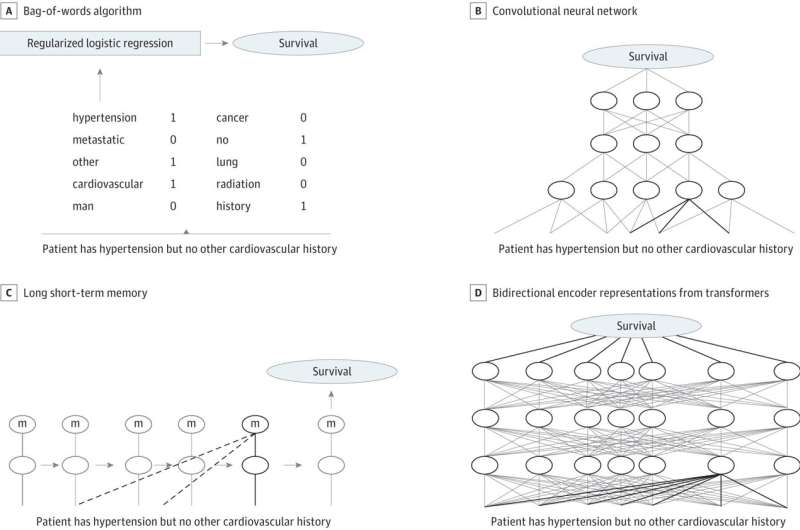This article has been reviewed according to Science X's editorial process and policies. Editors have highlighted the following attributes while ensuring the content's credibility:
fact-checked
peer-reviewed publication
trusted source
proofread
AI predicts cancer patient survival by reading doctor's notes

A team of researchers from the University of British Columbia and BC Cancer have developed an artificial intelligence (AI) model that predicts cancer patient survival more accurately and with more readily available data than previous tools.
The model uses natural language processing (NLP)—a branch of AI that understands complex human language—to analyze oncologist notes following a patient's initial consultation visit—the first step in the cancer journey after diagnosis. By identifying characteristics unique to each patient, the model was shown to predict six-month, 36-month and 60-month survival with greater than 80 percent accuracy. The findings were published today in JAMA Network Open.
"Predicting cancer survival is an important factor that can be used to improve cancer care," said lead author Dr. John-Jose Nunez, a psychiatrist and clinical research fellow with the UBC Mood Disorders Centre and BC Cancer. "It might suggest health providers make an earlier referral to support services or offer a more aggressive treatment option upfront. Our hope is that a tool like this could be used to personalize and optimize the care a patient receives right away, giving them the best outcome possible."
Traditionally, cancer survival rates have been calculated retrospectively and categorized by only a few generic factors such as cancer site and tissue type. Despite familiarity with these rates, it can be challenging for oncologists to accurately predict an individual patient's survival due to the many complex factors that influence patient outcomes.
The model developed by Dr. Nunez and his collaborators, which includes researchers from BC Cancer and UBC's departments of computer science and psychiatry, is able to pick up on unique clues within a patient's initial consultation document to provide a more nuanced assessment. It is also applicable to all cancers, whereas previous models have been limited to certain cancer types.
"The AI essentially reads the consultation document similar to how a human would read it," said Dr. Nunez. "These documents have many details like the age of the patient, the type of cancer, underlying health conditions, past substance use, and family histories. The AI brings all of this together to paint a more complete picture of patient outcomes."
The researchers trained and tested the model using data from 47,625 patients across all six BC Cancer sites located across British Columbia. To protect privacy, all patient data remained stored securely at BC Cancer and was presented anonymously. Unlike chart reviews by human research assistants, the new AI approach has the added benefit of maintaining complete confidentiality of patient records.
"Because the model is trained on B.C. data, that makes it a potentially powerful tool for predicting cancer survival here in the province," said Dr. Nunez.
In the future, the technology could be applied in cancer clinics across Canada and around the world.
"The great thing about neural NLP models is that they are highly scalable, portable and don't require structured data sets," said Dr. Nunez. "We can quickly train these models using local data to improve performance in a new region. I would suspect that these models provide a good foundation anywhere in the world where patients are able to see an oncologist."
In another stream of work, Dr. Nunez is examining how to facilitate the best-possible psychiatric and counseling care for cancer patients using advanced AI techniques. He envisions a future where AI is integrated into many aspects of the health system to improve patient care.
"I see AI acting almost like a virtual assistant for physicians," said Dr. Nunez. "As medicine gets more and more advanced, having AI to help sort through and make sense of all the data will help inform physician decisions. Ultimately, this will help improve quality of life and outcomes for patients."
More information: John-Jose Nunez et al, Predicting the Survival of Patients With Cancer From Their Initial Oncology Consultation Document Using Natural Language Processing, JAMA Network Open (2023). DOI: 10.1001/jamanetworkopen.2023.0813

















